Everyone has their favourite Wes Anderson film, and it's always fun to discuss how we rank them. In truth, if you ask me at different periods in my life - or even at different times of the day - this list will inevitably look different. However, some things remain constant for me, and that is that Anderson makes great films.
We've come to know Anderson as almost having his own genre, with certain aspects to his filmmaking always present and wonderfully unique to his style. Going through his parents' divorce at a young age, his films almost always tackle grief, death or loneliness, and yet never feel overly morbid. He has created a melancholy space of being comedic without ever being a comedy, focusing on idiosyncratic characters who become unglued being surrounded by dysfunctional and fractious families - and herein lies the entertainment.
There is a list of elements that are immediately recognisable as "Andersonesque". His partnership with cinematographer Robert Yeoman crafting symmetrical and theatrical framing, Anderson's use of pastel colour spectrums, chaptered stories, incredible character detail and props, and most notably, the journeys his characters endure from earnest and tragic beginnings to becoming the best version of themselves.
Whether or not you see him as a modern-day auteur is up to you, but what will become clear when going through this list is that I have love for all of his films. This not so much about being a competition, but more about what these films mean to me, what I gained from them, and why I will always revisit them. If compiling this list has taught me anything, it's that Anderson is a filmmaker worth celebrating.
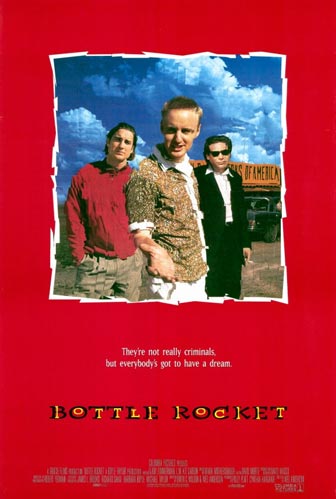
Straight out of film school and in his early 20s, Anderson, along with the Wilson brothers (Owen and Luke), made a short film called 'Bottle Rocket', and it was immediately picked up as a feature following its Sundance debut. There is a reason why I have ranked this film last on the list, and that's because that whilst it has great elements and it's an enjoyable enough 90s comedy flick, it doesn't really reach the heights of the rest of his filmography. It's doesn't have the same look and feel of his other works, although his touches are clear to see even from so early on. The obsessive characters, the quirky dialogue and even some camera techniques are on show, but I would argue that he never had full control over this picture, which makes sense given that he was so young and so inexperienced.
In spite of this, the early signs are apparent that Wes Anderson was going to be a filmmaker to look out for. Here is a gentle and comedic film that we can look back on with admiration, for if nothing else, it's the failures of 'Bottle Rocket' that gave Anderson the tools to learn and improve on for his next feature, 'Rushmore'. The mere fact that he made this film so young really shows what kind of a brilliant filmmaker he is. Comfortable in his own skin and wanting to do something new, with 'Bottle Rocket' Anderson defined the moment to kick start his career, one that continues to gain momentum.
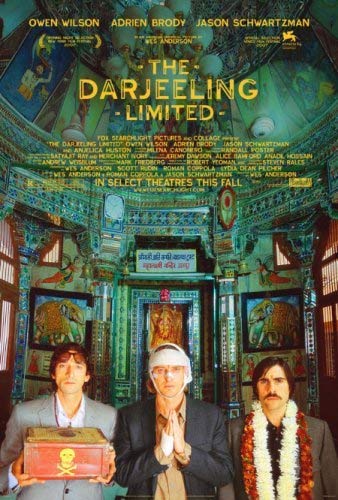
'The Darjeeling Limited' follows the Whitman brothers after the death of their father, travelling across India on a journey to bond and find inner peace. They all have their excuses for escaping life back at home, whether it be a pregnant wife, a longing ex, or previous suicidal thoughts; these are not your typical brothers, although they are typical Anderson characters. Equal parts frustrating and heartfelt, they speak to each other like real brothers, trying to find meaning to everything that has happened to them on their respective journeys of loss, something which Anderson loves to explore. They have problems - serious problems - but by the end, it doesn't get in the way of cleansing themselves, finding both peace and humility by the film's conclusion.
Their need to control and yet desperation for a meaningful connection prevents them from seeing their ways, opting instead to simply try and fix everything on the spot, obsessed with doing it the "right way". They carry around their father's luggage, metaphors and allegories are aplenty here, but ultimately, I just didn't connect much with 'The Darjeeling Limited', hence its position on the list.
That's not to say it isn't great, or that it doesn't mean more to someone else. When going through grief or loss, people will find their own comforts, much like the Whitman brothers. It's the first feature from Anderson which feels very "human", and credit to that. The design of the trains and landscapes are stunningly used, and expert camera techniques are on full display, managing to use his trademark whip-pans and zooms, which are both innovative and delightful. It's a great watch and an entertaining ride, and its position on this list shows how highly I regard his other work.
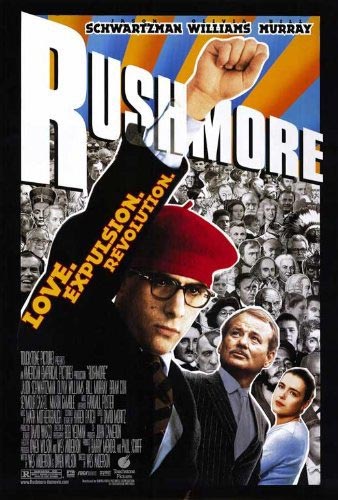
"Sic Transit Gloria: Glory fades. I'm Max Fischer." A great line spoken by Anderson's first really memorable character, Max; a privileged high school student at a wealthy private school, Rushmore. Sure, he's not privileged in the financial sense, but he is given numerous and frankly outlandish opportunities to turn his academic record around. Alas, his self-entitlement prevents him, and his extracurricular activities eventually lead to his expulsion.
'Rushmore' is the film that starts to cement Anderson's style. He begins to experiment with depth and techniques that will soon become mainstays, but for now, they're just elements he wants to play with to service his story. Audiences start to understand him as a filmmaker, as Anderson uses homages and references to shape the way he wants to define himself. Tracking shots and montages take centre stage, so even though Anderson doesn't want his style to detract from his characters, it sometimes can, and it's something he will continue to grapple with throughout his career.
Another notable mainstay of Anderson's filmography which is first seen here are the capabilities and maturity of his child characters. Max is flawed and believes he holds power that he doesn't, but because he takes himself seriously, so can we, and he eventually learns to listen to his heart over his ego, culminating in a joyous and humble finale, a breathtaking school play on the Vietnam War.
Obviously, you can't about talk about 'Rushmore' without talking about the curtains, a framing device used a few times throughout the film by Anderson which is instantly iconic, bringing a wonderful theatricality to it all. As the curtains draw to a close on this feature, so too does Anderson's youth and the failures of 'Bottle Rocket'.
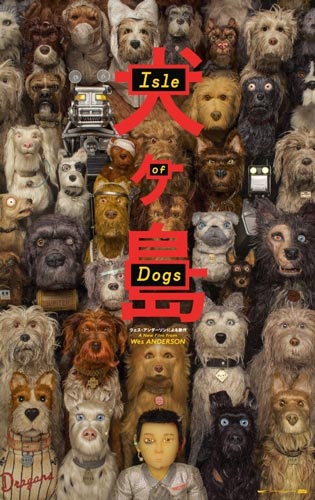
When compiling this list, it seemed so harsh to place 'Isle of Dogs' so low, because it's an unbelievably impressive feat of imaginative artistry. Whilst it doesn't quite reach the heights of his previous stop-motion animation adventure 'Fantastic Mr. Fox', Anderson clearly still felt the spark to continue world-building using this art form, and he does so spectacularly.
Taking place in Japan in the not-too-distant future, all dogs have been banished to a trash island after fears they were spreading a canine flu. A young boy then embarks (pardon the pun) on an adventure, with the help of a pack of dogs, in search of his lost and beloved pet, lighting the spark of revolution. This is by no means a cute dog film; it feels purposefully scrappy and edgy, but I think it works so well against the now all-too-familiar symmetry and structure of an Anderson picture. These characters have all been burnt in some shape or form, which allows this film to explore more mature or "adult" themes, something the beauty of the animation works so well against. There's a tactility in the stop-motion, especially in the fur, that makes it feel genuine, so it feels only natural that at the core of this film is a soft heart.
I love the use of subtitles here too, being completely embedded into the story, harnessing clever devices such as foreign exchange students or real-time translators, to translate what's spoken on screen. It doesn't work as well in Japan for obvious reasons, which subsequently led to mixed reviews, but as an English-speaking person, I can only applaud the language barriers Anderson builds between the humans and dogs.
You could watch this film within its borders of a story about a boy and his dog, or you could read deeper into its xenophobic and immigration-charged agenda, and either is fine because art is made for the viewer, not the artist. But I strongly believe that either way, this film can be celebrated. If nothing else, the sushi-making scene, which took eight months to make, is stunning in its elegance.
Click here to read our full theatrical review of 'Isle of Dogs'.
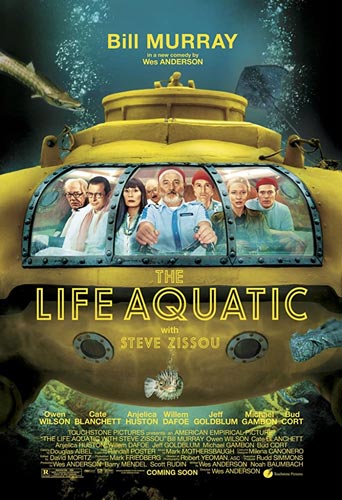
"Nobody knows what's going to happen, and then we film it, that's the whole concept." That line speaks to how this film is viewed, and why this is probably the most controversial ranking if you take populist votes into account. Fortunately, I don't have to, so I'm leaving it here. I went into this film with minimal expectations after people's insistence of its lowly status; a box office bomb and Anderson's most critically maligned film, so surely there was nothing for me to see here. And yet it quickly became one of my favourites.
Co-written with frequent collaborator Noah Baumbach ('Marriage Story'), both of which often write about struggling middle-class white Americans, this cartoonish, documentary style, popup-book-like veneer sees Anderson delve into themes of grief, revenge and legacy. It's a fascinating insight that goes some way in explaining why this was such a commercial and critical catastrophe, as these are heavy topics are approached with the whimsical and colourful visuals we've become accustomed to.
There are made-up sea creatures depicted in stop-motion animation (Anderson's first attempt at the form), action set pieces taken straight from the classic Bond films of the '60s, dollhouse set pieces, and ultimately a rough, jagged feel to the whole thing. I don't know why it works, it shouldn't work, but it just does. The characters have complexities about them, and yet show a lightheartedness and a quirkiness we can grab onto, with Bill Murray (1984's 'Ghostbusters') cast so perfectly in his role, bringing edge and grief to an otherwise wacky caricature.
We get a real glimpse into future Anderson films, his detailed world-building and cinematography really taking shape, all of which serve the purpose of journeying the grief. Very little in 'The Life Aquatic with Steve Zissou' is realistic or grounded, and to list everything in this film would make it sound insane - which probably speaks volumes of its structural issues - and yet as Zissou captains his crew to kill the "Jaguar Shark", there is something so cathartic and genuine in their experiences of their grief. The reputation of this film has not grown over time, but I strongly believe it really needs to be given more opportunities, as only Anderson could expertly pull off a cartoonish and ambitious tale about losing a loved one like this.
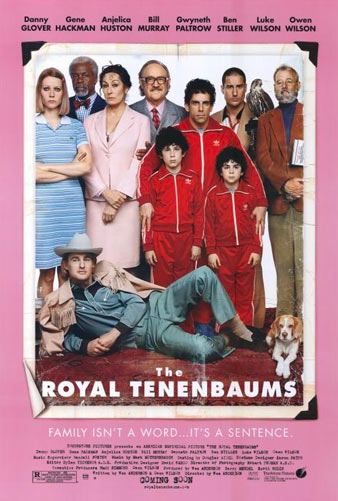
Owen Wilson ('Zoolander') was back in the writing chair to help Anderson with this comedic and heartfelt look into a family under the microscope. 'The Royal Tenenbaums' is nothing short of an indie gem, and growing up in high school, if you wanted to seem like the hipster art student this had to be your favourite film. 'Rushmore' was a success and gave Anderson the keys to explore his craft further, and what he gained from his previous experiences is a work of art.
His largest scale film at the time, Anderson showed that not only could he handle the increased pressure, but that he was so confident in his abilities that he was still able to mould a completely unique and creative film. I just love the sets and how his cinematographer, Robert Yeoman, embedded their style to tell a much darker story. It's his first time delving into real violence and tragedy, which he doesn't shy away from, highlighting a real darkness at the heart of this family.
Anderson went through his own parents' divorce at a young age and it obviously had an impact - how could it not? - and it aids his quest in showcasing the wounds, both emotional and physical, that is felt from a trauma. The film opens with the announcement of the divorce, and it causes implosions from all the characters through their own personal disasters. There is an inevitability that, even if it is collateral, what we say and how we act in the moments of tragedy can lead to something darker.
Anderson has realised his artistic ability and displayed it everywhere he could, from the mosaic-like set designs to the editing and wit, his imprint on this film made him the auteur that he is today, and it is because of the personal characters he creates that his techniques are allowed to bloom. Anderson thrives in a melancholy environment, and it should be applauded that his style doesn't detract from the nucleus of his storytelling. A wonderfully crafted, funny and beautifully put together piece; if 'Rushmore' put his name on the map, 'The Royal Tenenbaums' cemented his status.
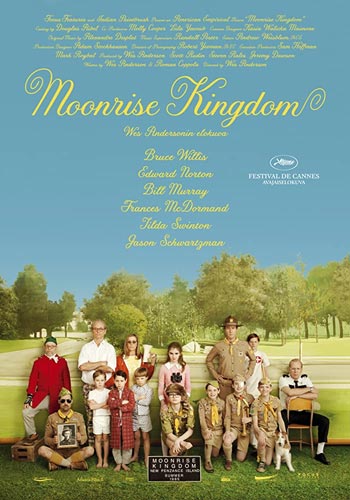
I always loved movies growing up, but I would be the first to admit my taste was hardly "outside the square" or auteur-centric. Things started to change as I left my teenage years behind me, and then came my eureka moment walking out of the cinema after seeing 'Moonrise Kingdom'. This was unlike anything I had seen before and I couldn't get enough of it, paying to see it in the theatres twice in very quick succession. It probably ranks higher for me on a personal level because of its impact rather than its actual content, however in saying that, every time I revisit this film it leaves me with such glee that I can't escape.
'Moonrise Kingdom' follows two 12-year-old hopeless romantics as they run away to the wilderness in search of a new life together, away from their respective guardians. The story plays out like a fairytale, unbelievably narrated by a man who ends up kind of being in the film, but also knows the past and future, adding to the already imaginative and playful theatricality in this comic romance. These children are unique individuals to say the least; much like Anderson's previous works, they are not only matured well beyond their years, but they are complex and intense, a stark contrast to the adult characters we come to know. It is the wisdom and courage of the younger generation that leads the way, for after being cast aside by their guardians, it is their unwavering belief in romance that is at the heart of this film.
Sure, their love might not last and it might not even be real, but Anderson depicts a powerful experience of childhood romance, which coupled by their honest, earnest and adorable faith to one another, make it wholeheartedly believable.
'Moonrise Kingdom' explores what it means to be a responsible adult, and being made to look completely incompetent only fuels the childhood innocence into something much deeper, something completely different to the adults who have lost their way, and that is to value independent thoughts and look forward to what lies ahead, not lament what has already been. Sharp edits, colourful tones, unforgettable characters and a script that plays like a song, this film will forever be responsible for awakening the senses and opening my eyes to a filmmaker who subverts film language in all sorts of delightful ways.
Click here to read our full theatrical review of 'Moonrise Kingdom'.
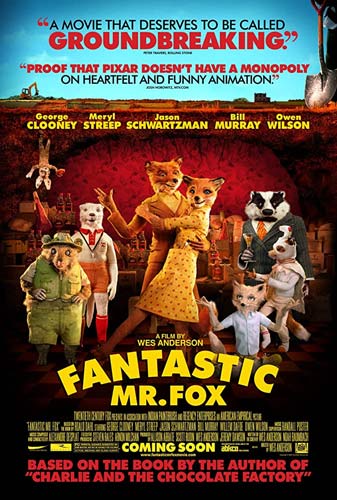
If 'Life Aquatic' and 'The Darjeeling Limited' are considered your biggest flops as a director, you can count yourself pretty lucky. Nonetheless, Anderson was on the back of his two biggest commercial failures, and from those ashes arose, in my opinion, an upward curve to his golden era of filmmaking.
Based on the Roald Dahl children's novel, Noah Baumbach was back to help Anderson adapt 'Fantastic Mr. Fox' into a charming film for everyone to gain something from. Mr. Fox (George Clooney, 'Ocean's Eleven') is fed up with his current state in life and feels obliged to return to his old animalistic habits, stealing chickens from the three local corporate farmers.
There is a reason this film ranks second of my list, and long story short that fundamental reason is its lighthearted, meaningful and fascinating adaption. Anderson mixes the ingredients of his usual styles and themes and ended up bottling what can be best described as a special piece of art. Despite how it was originally promoted, this film appeals to much more than just children, and unlike other animations who try to appeal to a wider audience by hiding more "adult" jokes, 'Fantastic Mr. Fox' actually challenges adults as well as teaching and entertaining them.
Mr. Fox admits his wrongdoings throughout the film, surpassing the expected arc of a hero's journey, resulting in a beautiful and well-earned selfless and humble moment at its conclusion, which is not necessarily a happily-ever-after. It tackles the fear of defeat and makes sure one is aware of not only their nature and limitations, but their selves.
This film is animated purely for an artistic purpose, not to take away from the important messages of the story, and the stop-motion animation is absolutely stunning. You can see the artists' fingerprints on everything, both literally and figuratively, which when you think about it is really quite special. The blueprints of what this film would become can be seen in all his other works, most notably the creatures of 'Life Aquatic', with the handmade quality perfectly suited to the dollhouse vibe of his previous films. His sets always feel miniaturised and animated, which equates to everything produced from this point on as "Andersoneque".
This is his most widely-acclaimed film, and it is easy to see why. It's funny, relatable, gorgeous, easy to watch and ultimately thought-provoking. This is what I mean when I say it's a film for everyone, bringing all the elements together for an unforgettable ride.
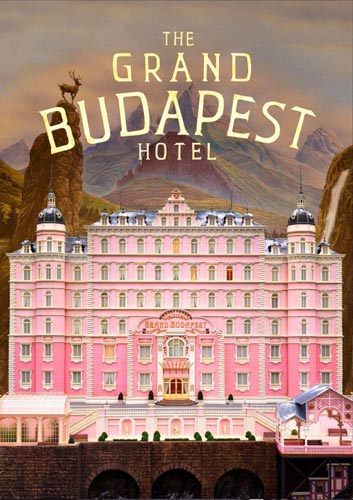
My top-ranked Anderson film will come as no surprise to anyone who knows me, because I speak about the brilliance of this film a lot. Everything that Anderson produced up until this point comes together in his most structurally and literarily ambitious film to date, one which I believe is his magnum opus. Many lament Anderson as over-stylising, choosing to parade his "Andersonesque" touches over any real substance, but I refuse that the same can be said of the 'The Grand Budapest Hotel'.
With each additional viewing, there is a depth that continues to unfold, and I don't just mean the structure of a tale within a tale within a tale within a tale. You leave this film at first remembering the colour pallets, unique characters, doll-like set pieces, aspect ratios and comedy, but what becomes abundantly clear and shines brightest over time is the tragedy, the bitterness, the stories of war, refugees, and grief.
Perhaps most impressively, even though these darker elements to the story are drawn together with whimsy, it never detracts or distances from the heart of the film. The style plays an important function, matching the tone and narrative with the respect and dignity it deserves, proving once again that Anderson matures along with his films. I love the characters and the weight of the storytelling, helping the emotions feel real to the point of an inconsolably sad ending. The lush and playful texture in the costumes, sets and Yeoman's cinematography are fuelled by loss; in this world, death is non-negotiable.
Audiences are left with the paradoxically empty and yet pulsating feeling that whilst life may destroy the art will preserve, and we as a viewer will have to overcome our own personal Grand Budapest Hotel. As we've come to see with all of Anderson's films, the exploration of loss and the inability to overcome the grief that follows is at the forefront of an otherwise enchanting and colourful tale, and it's his genius that allows that contrast to express itself with a melancholy undertone that fits like a manicured glove.
Click here to read our full theatrical review of 'The Grand Budapest Hotel'.

/filters:quality(75)/toppic/kraven-the-hunter-2.jpg)
/filters:quality(75)/toppic/the-lord-of-the-rings-the-war-of-the-rohirrim-2.jpg)
/filters:quality(75)/toppic/kiss-me-kate.jpg)
/filters:quality(75)/toppic/heretic.jpg)
/filters:quality(75)/toppic/wicked.jpg)
/filters:quality(75)/toppic/maria.jpg)
/filters:quality(75)/toppic/gladiator-2.jpg)
/filters:quality(75)/toppic/the-room-next-door.jpg)
/filters:quality(75)/toppic/the-brutalist.jpg)
/filters:quality(75)/toppic/here-2024.jpg)
/filters:quality(75)/toppic/the-lord-of-the-rings-the-war-of-the-rohirrim-2.jpg)
/filters:quality(75)/toppic/thelionking.jpg)
/filters:quality(75)/toppic/sleepingbeauty2.jpg)
/filters:quality(75)/toppic/pocahontas.jpg)
/filters:quality(75)/toppic/theswallowsofkabul.jpg)
/filters:quality(75)/toppic/titane.jpg)